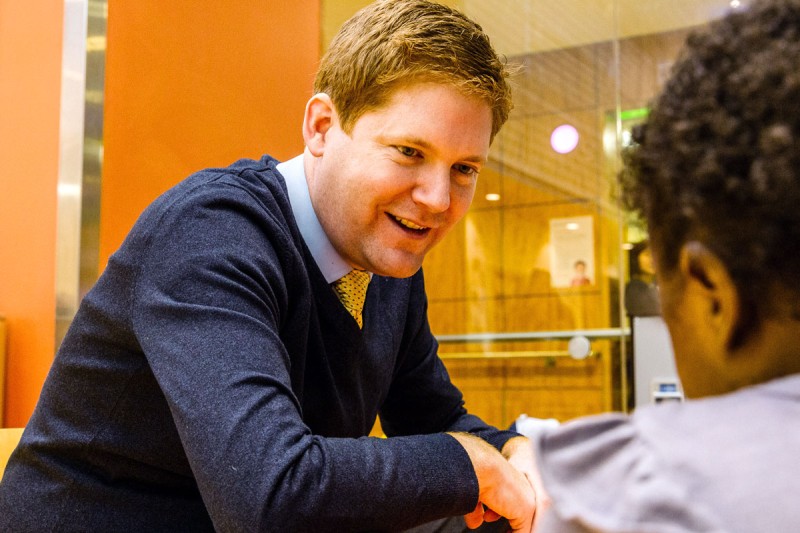
The bone marrow transplant doctors and researchers at MSK Kids are world-renowned for providing excellent and compassionate care to every young person they meet. They are also at the forefront of developing treatments to cure life-threatening disorders of the blood, bone marrow, and immune system. When you bring your child to us for care, you benefit from decades of pioneering work that have saved thousands of lives, not just in New York but around the world. Transplant procedures created and refined by our doctors are now used to treat a wide range of blood cancers and disorders at other centers.
A History of Firsts at MSK
When Richard J. O’Reilly, our former Chair of Pediatrics, founded MSK’s Pediatric Bone Marrow Transplant Service, it was one of the original transplant centers in the world. Over the years, our doctors have achieved a number of firsts:
- In 1973, we performed the first bone marrow transplant from an unrelated donor to a patient. Since then, we’ve completed thousands of transplants. MSK also performed the first successful transplant of bone marrow from a partially matched unrelated donor to a patient.
- G-CSF (also known as filgrastim or Neupogen®) was developed at MSK in the 1970s. This drug is now used around the world to help speed the renewal of a patient’s white blood cells after chemotherapy and transplant. This is done to reduce the severity and frequency of infections.
- MSK pioneered the introduction of “T-cell depletion,” a way to remove white blood cells from a donation before giving the stem cells to the patient. This reduces the risk of a complication called graft-versus-host-disease (GVHD). T-cell depletion is now used around the world.
- MSK was first to use a short course of radiation therapy before transplant to boost the anticancer effects of treatment and to reduce side effects on growth and hormonal function.
- MSK initiated the use of immune cells from a donor’s blood to treat viral infections and disease relapse after a transplant.
- MSK is a founding member of the National Marrow Donor Program, a nonprofit that helps patients get bone marrow or umbilical cord blood transplants. We also participate as a collection center and transplant center for the organization.
National Recognition
The bone marrow transplant program at MSK has been recognized by many leading groups:
- Children’s Oncology Group (COG)
- National Marrow Donor Program (NMDP)
- Bone Marrow Transplant Clinical Trials Network (BMTCTN)
- Pediatric Blood and Marrow Transplant Consortium (PBMTC)
- Pediatric Immune Deficiency Treatment Consortium (PIDTC)
- Center for International Blood and Marrow Transplant Research (CIBMTR)
- The Foundation for Accreditation of Cellular Therapy (FACT)
Care that Goes Beyond Treatment
Bone marrow transplantation and cellular therapies are multistep procedures with long recoveries. We know this is a challenging time for children and families who face this. That’s why in addition to treatment, we provide a number of support services for your child and family. Learn more about the specialized care and support services and survivorship programs at MSK Kids.
A Commitment to Research
Ever since the start of our program, we have remained committed to developing cutting-edge treatments that make bone marrow transplantation safer and more effective for children everywhere. Today, MSK Kids doctors are working to improve the use of T cells from donors to fight infection and to prevent or treat a relapse of cancer. Research into gene therapy is also under way. The goal is to transfer working genes into blood cells and immune cells to treat genetic diseases.
As a leading center in innovation, MSK Kids conducts numerous clinical trials to evaluate new applications of bone marrow transplantation and methods to both reduce the risk of complications and boost treatment success. Discover the importance of clinical trials and learn about our newest studies here.
Reducing A Serious Complication
Graft-versus-host disease (GVHD) is one of the most serious and common complications of bone marrow transplantation and occurs when immune cells from the donor attack tissues of the patient. This causes inflammation and other symptoms. While lower than that of older patients, the risk of GVHD in young patients is still significant. By learning how to remove the damaging T cells from a stem cell donation (this is called T-cell depletion), our doctors have dramatically reduced the risk of GVHD and achieved some of the lowest GVHD rates in the country. Since T-cell depletion slows down the immune system’s recovery, MSK Kids is also evaluating a new approach where only the T cells that cause GVHD are removed, leaving the “good” T cells that help patients fight infection. Learn more about our latest innovations.

